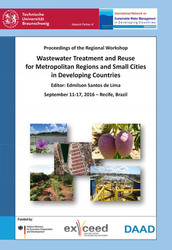| Areas | |
|---|---|
| Serie de libros (97) |
1381
|
| Nachhaltigkeit |
3
|
| Gesundheitswesen |
1
|
| Letra |
2370
|
| Ciencias Naturales |
5407
|
| Matemática | 228 |
| Informática | 319 |
| Física | 980 |
| Química | 1364 |
| Geociencias | 131 |
| Medicina humana | 243 |
| Estomatología | 10 |
| Veterinaria | 108 |
| Farmacia | 147 |
| Biología | 835 |
| Bioquímica, biología molecular, tecnología genética | 121 |
| Biofísica | 25 |
| Nutrición | 45 |
| Agricultura | 1005 |
| Silvicultura | 201 |
| Horticultura | 20 |
| Ecología y conservación de la tierra | 148 |
| Ciencias Ingeniería |
1798
|
| General |
98
|
|
Leitlinien Unfallchirurgie
5. Auflage bestellen |
|
Erweiterte Suche
Wastewater Treatment and Reuse for Metropolitan Regions and Small Cities in Developing Countries (Tienda española)
Proceedings of the Regional Workshop, September 11-17, 2016 – Recife, Brazil
Müfit Bahadir (Editor)Previo
Indice, PDF (100 KB)
Lectura de prueba, PDF (160 KB)
Sustainable Water Management is essential for the social, economic, and environmental growth of developing countries. Many of those had very high population growth rates in the last century, resulted in fast urbanization and strengthened by heavy migration from rural areas to the cities either of big or small size. Water supply of good quality and adequate quantity, especially in countries with semi-arid regions, and appropriate sewerage systems and treatment of wastewaters impaired severe constraints for the population. Nevertheless, many alternatives for wastewater treatment were developed with the participation of universities and research institutions as well as by practitioners. Substantial efforts have been directed towards the search of good alternatives for domestic sewage treatment in metropolitan regions and small cities in developing countries in order to comply with their particular economic and environmental conditions. The use of conventional treatment technologies as well as advanced alternatives for treatment and post-treatment of wastewater, issues of plant scales in centralized and decentralized systems, and possible reuse of the effluents were aimed to present on this workshop and to discuss theoretical and practical aspects.
The main objectives of the workshop were (i) to share experiences, knowledge, and research between different partners; (ii) to discuss major problems and challenges in the field of wastewater treatment and reuse in Metropolitan Regions and Small Cities in Developing Countries; (iii) to present suitable treatment technologies for domestic wastewater for the removal of recalcitrant substances and micro-pollutants from domestic sewage and industrial effluents; and (iv) likeliness of reuse of treated wastewater in urban areas, in the industry, and in agriculture. Individual topics dealt with were (v) alternatives for domestic sewage treatment in metropolitan regions and small cities; (vi) anaerobic processes for the treatment of domestic sewage and industrial wastewaters; (vii) stabilization ponds; (viii) aerobic granular sludge; (ix) post-treatment processes; (x) centralized and decentralized systems; and (xi) water reuse.
| ISBN-13 (Impresion) | 9783736994546 |
| ISBN-13 (E-Book) | 9783736984547 |
| Formato | B5 |
| Idioma | Inglés |
| Numero de paginas | 140 |
| Edicion | 1. Aufl. |
| Lugar de publicacion | Göttingen |
| Fecha de publicacion | 27.01.2017 |
| Clasificacion simple | Proceeding |
| Area |
Agricultura
|
| Palabras claves | Sustainable Water Management, population growth, urbanization, migration, water supply, metropolitan regions, small cities, developing countries, environment, wastewater treatment |
| URL para pagina web externa | http://www.exceed-swindon.org/ |








